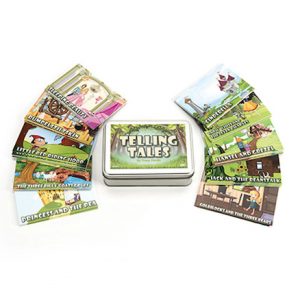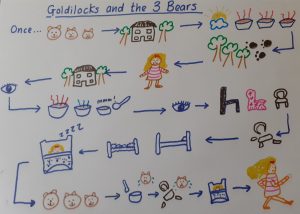“Tell me the facts and I’ll learn. Tell me the truth and I’ll believe. But tell me a story and it will live in my heart forever.”
Native American proverb
If ever there was a period in which stories were important, this is it! We all need that feeling of being lost in another reality from time to time and no more so than now when the world feels anything but normal.
As Walt Disney said, “That’s what storytellers do. We restore order with imagination. We instil hope again and again.”
Storytelling Week aims to celebrate the tradition of this ancient oral art form with its roots in every part of the world and is usually celebrated by people of all ages in places such as schools, clubs, theatres, museums and even care homes.
The Society for Storytelling provide a central hub for all kinds of events and provide suggestions and resources for all ages and settings.
Why is storytelling important?
As a teacher, I was very aware of the need to allow children time to tell stories – real life or otherwise – and always tried to keep in mind that some find it much easier than others, but that even if they need persuading, everyone has something valuable to communicate. Because time is at such a premium in the busy curriculum (and I fear because aural skills do not easily translate into tangible evidence) we feel under pressure to get children writing and recording their thoughts rather than allowing enough time for them to talk. Even as parents, how often do we give our children the time or opportunities to do this?
Communication
And yet the ability to communicate and to tell a story is an incredibly important life skill, and not just for celebrities on Graham Norton! Being able to talk fluently and with good vocabulary is crucial and can make such a difference to children’s life chances. Much of our usual daily oral communication is in single words, short phrases, or sentences, so many of us find speaking it a more prolonged way quite challenging. Telling stories is a great way to practise, improving communication skills and confidence.
Here are just a few ideas for ways in which you and your children might enjoy telling stories together:
Tell stories
- Rather than reading a story, take turns to tell them. Let children hold a book they are familiar with and encourage them to use the pictures rather than the words as prompts. Children often do this as part of learning to read, but not as often once they can read the words. The fact that they are relating the story to the book will encourage them to use language that is different from everyday speech and they will add their own interpretations to the story.
Make a story chain
- This can be done anywhere – a car journey for example, or out on a walk. One person begins a story with a sentence, the next person adds another sentence and so it goes on. Children often love it when they and people they know are included in the plot and it is very personalised! What about these for beginnings….
- “It was in the winter of 2014 when I first found out I could fly…”
- “To his complete surprise, Dylan woke up on a sandy beach with the sun beating down – this was not where he went to sleep…”
- “Once, deep, deep under the sea, lived a girl called…”
- You might even try a one-word-each story chain. How far can you get?
“The story – from Rapunzel to War and Peace – is one of the basic tools invented by the human mind, for the purpose of gaining understanding. There have been great societies that did not use the wheel, But there have been no societies that did not tell stories.”
Ursula K. Le Guin
Storytelling chair
- Allocate a chair to be your ‘storytelling chair’ and decorate it to look a bit special, perhaps by covering it with some sort of material and adding cushions! Anyone who sits in it becomes the storyteller with powers to entrance their listeners!
- Use very well-known stories and tell them together. Many children (and adults) feel more confident telling stories when they know them inside out and know exactly what comes next. Fairy tales are great for this because there is often lots of repetition, providing a hook for children. These Telling Tales Activity Cards use 10 traditional tales to encouraging storytelling.

Pie Corbett
- The author, Pie Corbett has been very influential in encouraging group storytelling. (Search the internet for his well-known re-telling of ‘Little Red Hen’. It is brilliant!) Tell your chosen story together and using the same words. Adding actions can also help the memory a great deal, as Pie Corbett demonstrates.
- Use props. Choose a few key items from your chosen story to act as memory prompts and to add interest and focus for listeners.
- Make a map of the story, again to act as a prompt. The story map might have pictures with arrows.
Use puppets
Imagine that it is a different character telling the story. Children often feel more confident telling a story using a puppet. It doesn’t have to be a real puppet. It could be a cuddly toy or perhaps a sock with a couple of eyes glued on. Set up a makeshift puppet theatre, using a cardboard box or whatever you can think of. Children love performing stories in this way.
Choose 3 random items from around the room. The storyteller must tell a short story (you might even set a time limit of 2 minutes) incorporating the 3 objects! Can they mention them all in a way that makes sense? This is a real tester of quick thinking and creativity.
“People think that stories are shaped by people. In fact it’s the other way around …”
Terry Pratchett, novelist
Everyone has at least one good story to tell and the ability to tell a great story is a wonderful skill to have. We all know people who can make us laugh or cry by relating their tales of joy, woe or even something seemingly mundane, so if at all possible, let’s tell our children about storytelling week and take part however we can.



